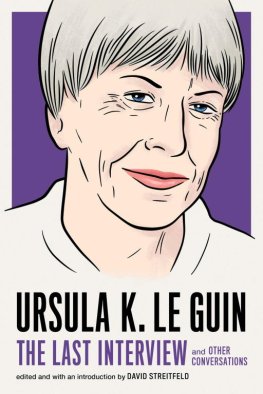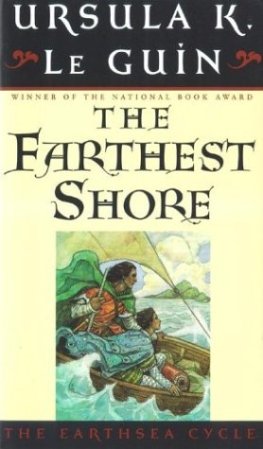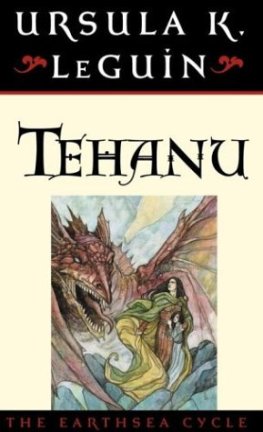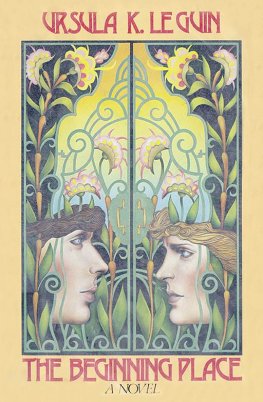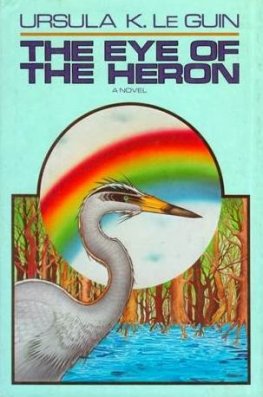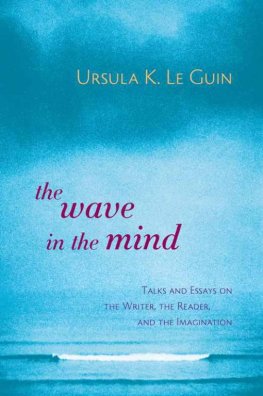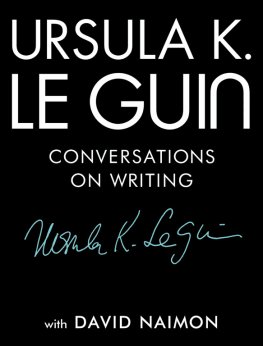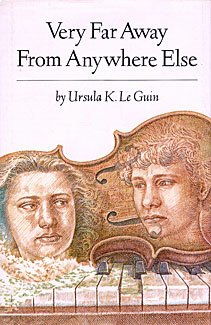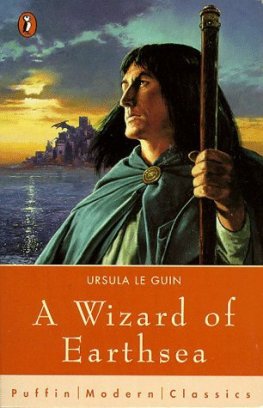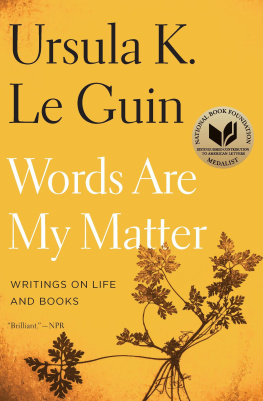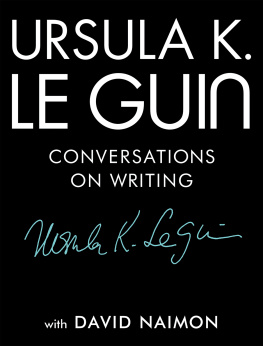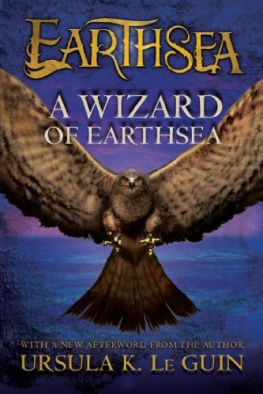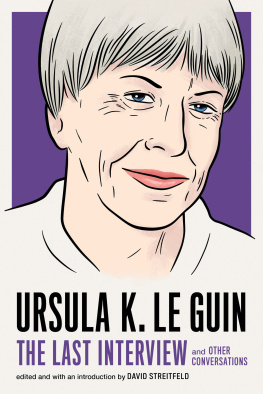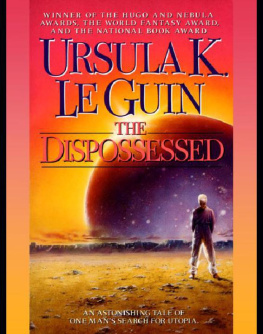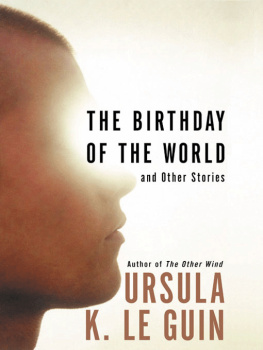Ursula Le Guin - Ursula K. Le Guin: The Last Interview and Other Conversations
Here you can read online Ursula Le Guin - Ursula K. Le Guin: The Last Interview and Other Conversations full text of the book (entire story) in english for free. Download pdf and epub, get meaning, cover and reviews about this ebook. City: London, year: 2019, publisher: Melville House, genre: Non-fiction. Description of the work, (preface) as well as reviews are available. Best literature library LitArk.com created for fans of good reading and offers a wide selection of genres:
Romance novel
Science fiction
Adventure
Detective
Science
History
Home and family
Prose
Art
Politics
Computer
Non-fiction
Religion
Business
Children
Humor
Choose a favorite category and find really read worthwhile books. Enjoy immersion in the world of imagination, feel the emotions of the characters or learn something new for yourself, make an fascinating discovery.
- Book:Ursula K. Le Guin: The Last Interview and Other Conversations
- Author:
- Publisher:Melville House
- Genre:
- Year:2019
- City:London
- ISBN:978-1-61219-779-1
- Rating:5 / 5
- Favourites:Add to favourites
- Your mark:
- 100
- 1
- 2
- 3
- 4
- 5
Ursula K. Le Guin: The Last Interview and Other Conversations: summary, description and annotation
We offer to read an annotation, description, summary or preface (depends on what the author of the book "Ursula K. Le Guin: The Last Interview and Other Conversations" wrote himself). If you haven't found the necessary information about the book — write in the comments, we will try to find it.
Ursula K. Le Guin: The Last Interview and Other Conversations — read online for free the complete book (whole text) full work
Below is the text of the book, divided by pages. System saving the place of the last page read, allows you to conveniently read the book "Ursula K. Le Guin: The Last Interview and Other Conversations" online for free, without having to search again every time where you left off. Put a bookmark, and you can go to the page where you finished reading at any time.
Font size:
Interval:
Bookmark:
Ursula K. Le Guin
THE LAST INTERVIEW
AND OTHER CONVERSATIONS

INTRODUCTION
DAVID STREITFELD
Many celebrated novelists are not especially keen on interviews. They have nothing to say or theyve said it all before or theyd rather spend their time writing or theyre afraid of giving up the hard-won secrets to their work. An interview is, at best, something to be endured.
Ursula K. Le Guin was different. She loved the push and pull of a good conversation. Her stories were laden with meaning, but she wrote without conscious intention, as a voyage of discoverywhich meant that after publication she was delighted to entertain readers conclusions about where she ended up. She liked to do interviews in front of an audience and liked to do them by mail or email so she could weigh her replies. And she did them in person in her home, sometimes improving the transcript later, sometimes not. She always had something to say.
When necessary, Le Guin could play the role of the interviewer too, always better than whoever nominally had the job. Paul Walker, doing a Q&A for the fanzine Luna Monthly in 1976, could not visit her at her home in Oregon, so he asked from afar what would happen if he showed up and said, Tell me about yourself.
Sure, Le Guin playfully responded, I could give you a vivid description of Mrs. Le Guin (Tall, balding, full-bearded, she met me at the door with a hearty handclasp. Come in and help us gut the elk she boomed). But then I could give you other descriptions equally vivid (It was at first difficult to induce Mrs. Le Guin to speak, as she hung placidly head downward from a branch of the large catalpa tree in the drawing room).
And then, the joke made, she cut to her point: But what is truth, as jesting Pilate remarked, and what is the good of the cult of personality, I wonder? I mean some of us are Norman Mailer, right on, but others of us are middle-aged Portland housewives. It seems to me that my public self is in my books, and my private self is and should be of real interest only to myself and family.
She maintained that distinction for more than forty years, talking publicly but not privately. It was enough. Some writers need experience to feed the imagination, but Le Guins experiences were all in her head. She prided herself in having as few external stimuli as possible. She told an interviewer from Poland in 1988 her ideal schedule:
5:30 a.m.wake up and lie there and think.
6:15 a.m.get up and eat breakfast (lots).
7:15 a.m.get to work writing, writing, writing.
Noonlunch.
1:00-3:00 p.m.reading, music.
3:00-5:00 p.m.correspondence, maybe house cleaning.
5:00-8:00 p.m.make dinner and eat it.
After 8:00 p.m.I tend to be very stupid and we wont talk about this.
She felt sorry for writers who have to force themselves to the typewriter. She didnt understand writers block. I have always liked to work, she confessed. There was nowhere else she wanted to be, and even if there was, she couldnt get there: she didnt drive. She took a sabbatical year in London, went to Australia for a convention, and visited her familys Napa Valley ranch every summer. That was about it. I did that introversion/extroversion test once long ago, and I was just off the charts on introvert, she told Interview magazine in 2015. I was slightly inhuman. It was sort of scary.
With such a passion for routine and order, the wonder is that the books were not routine as well. She could have written forty-three volumes set in the Earthsea archipelago instead of a mere six, made a bundle off them, and, given our debased age, been just as acclaimed. But she let her inspiration guide her, and it went all over the place. She wrote novels, novellas, short stories, poetry, essays, performance art, commencement speeches, how-to-write manuals, introductions, translations, criticism, childrens picture books, books for young adults, the text for photography volumes, and letters to the editor. She liked blogging, even after it was no longer in vogue. She was a political activist in word and deed. She did not like Twitter.
Her first story, at age nine, was about a man who sees elves. No one else can see them, but they get him in the end. That might have been the bleakest thing she ever wrote. She spent her twenties unknown and unpublished, learning her craft, then another five years breaking into the field of science fiction with pleasant but minor works. Then bang, in her late thirties she wrote and published her first masterpieces, A Wizard of Earthsea and The Left Hand of Darkness, within months of each other. The former was issued by an obscure Berkeley press, the latter as a paperback from Ace, the big sci-fi factory, but the reputation of both quickly transcended these modest beginnings. Left Hand was particularly influential with other writers, showing them how they could stretch their subject matter into areas like gender, but I suspect Wizard molded more readers. It taught them what they owe to the worlda reversal of most fantasy, which is about what the world owes you. Wizard is about power and responsibility, and how the greatest enemy is often within.
In the mid-1970s, when I was a science fictionbesotted teen, Wizard was reissued by Bantam with a cover showing a dragon intertwined with a town and its castle, his nostrils belching smoke. Neither too cute nor too grim, that cover sold me, and I read my first Le Guin. I liked the book and appreciated its Tolkien-flavored heroic quest, but nothing more. In 2003, covering a senseless war, I took my copy to Baghdad. At night I would crouch behind the bed in my hotel room, the safest place I could find, listening to the explosions in the distance and reading. The book had changed, acquiring depths I never noticed. I learned how Ged, the young wizard who has immense gifts and is arrogant about them, was apprenticed to the mage Ogion:
When it rained Ogion would not even say the spell that every weatherworker knows, to send the storm aside. In a land where sorcerers come thick, like Gont or the Enlades, you may see a raincloud blundering slowly from side to side and place to place as one spell shunts it on to the next, till at last it is buffeted out over the sea where it can rain in peace. But Ogion let the rain fall where it would. He found a thick fir-tree and lay down beneath it. Ged crouched among the dripping bushes wet and sullen, and wondered what was the point of having power if you were too wise to use it, and wished he had gone as prentice to that old weatherworker of the Vale, where at least he would have slept dry. He did not speak any of his thoughts aloud. He said not a word.
His master smiled, and fell asleep in the rain.
Wizard, its sequels, and Left Hand dominated discussion of Le Guins work for decades, with the occasional addition of The Dispossessed for those of a more political bent. This irritated the writer, who found herself endlessly talking about books she had written long ago. When Nick Gevers, in an interview reprinted in this volume, asked her in 2001 about her current work, her relief was palpable. As she moved through her eighties, the entire scope of her career became visible and she became a cultural sage. In 2007, Death Ray magazine tried to sum things up:
Q: You are at the height of a very fruitful career. Youve already had a huge influence on many writers and readers. What do you hope your legacy will be?
LE GUIN: Irreverence toward undeserved authority, and passionate respect for the power of the word. Oh, and my books staying in print, too.
Font size:
Interval:
Bookmark:
Similar books «Ursula K. Le Guin: The Last Interview and Other Conversations»
Look at similar books to Ursula K. Le Guin: The Last Interview and Other Conversations. We have selected literature similar in name and meaning in the hope of providing readers with more options to find new, interesting, not yet read works.
Discussion, reviews of the book Ursula K. Le Guin: The Last Interview and Other Conversations and just readers' own opinions. Leave your comments, write what you think about the work, its meaning or the main characters. Specify what exactly you liked and what you didn't like, and why you think so.

